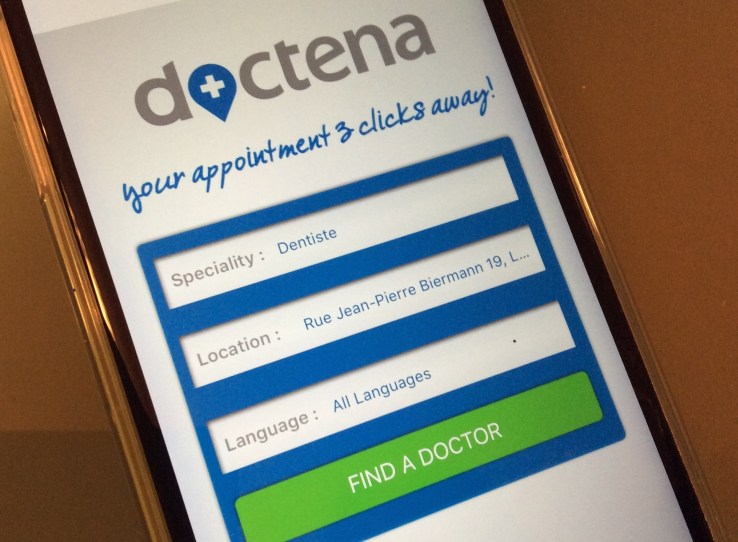
Brussels-based Doctena, founded in 2013, represents a familiar European startup story. It sells a medical booking platform that lets doctors offer online booking to their patients and has successfully launched in three European countries — Luxembourg, Netherlands and Belgium — juggling regulatory differences in each country and doing it all with modest funding.
The latter changes today with news that Doctena has raised a €4.5 million funding round made up of investment from undisclosed private investors, business angels, and debt. The company plans to use the new capital for additional European expansion — Switzerland is up next — and to ramp up its sales to team and bed down in the markets it already operates in.
“We want to ensure that every patient sees a doctor without picking up the phone. Patients want to find a doctor and book an appointment in 3 clicks,” says Doctena founder and CEO Patrick Kersten. “On the other hand, doctors are very reluctant to adopt new tools or change existing processes in their practice. So the challenge is to combine an intuitive, mobile ready user interface with the local, market leading applications that doctors are already using. By now, being able to adapt our software quickly to all these local applications is one of our competitive advantages.”
The ability to overcome regulatory challenges particular to each European country that Doctena is active, is cited as another competitive advantage. Kersten says the differences in national regulatory environments can be daunting at first, but is something he thinks the company is now up to speed with and should see it well-placed to expand to other European markets in 2016.
It also perhaps explains why Doctena has yet to find itself with a Silicon Valley challenger or a pan-European one. U.S.-based ZocDoc has yet to come to Europe, while France’s Doctolib is another potential competitor.
“Everybody knows that healthcare is a highly local business,” says Kersten. “We are confident that we have a competitive edge in the markets we operate as well as the ones we plan to enter, given the fact that we are a ‘European’ project from day one, with a multi-national management team and structure, where we can easily add additional countries.
“Since we have launched in several smaller markets we have built up experience in translating and adapting that some of our in-direct competitors still have to develop, as so far they have been focusing on a [single] large domestic market.”
Doctena’s offering is both B2B and B2C. For the doctors and clinics it targets, Kersten says the startup aims to primarily solve the pain-point of managing the daily patient schedule, which traditionally peaks in the morning. “It can get quite stressful to answer the phone. Stress levels rise as patients try unsuccessfully to call, and patients today can be quite demanding,” he says.
And for patients the upside is more convenience, with Doctena’s mobile and desktop versions letting them choose a practitioner according to speciality, language and area of practice, and instantly seeing and booking available time slots.
“Our added value lies in customizing the agenda management to correspond to how the practice works. Some practices want their agenda to be populated automatically by the patients. Others have more complex processes where more review is needed. Adapting to each practice is part of our success and probably one of the explanations of the low churn rate that we are experiencing,” adds Kersten.
Meanwhile, the market opportunity is large and nascent. I’m told that currently only about 3 per cent of medical bookings are made online, compared to 55 per cent of booking in the travel industry, which gives you an idea of how untapped this market is. Doctena makes money by charging doctors a monthly subscription for using the platform, based on size of the practice.

Comments
Post a Comment